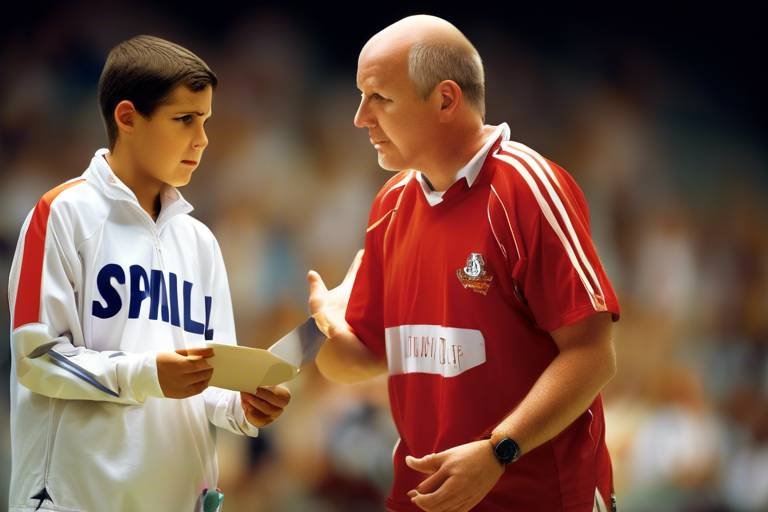Why Kids Lie and How to Encourage Honesty
In the intricate tapestry of childhood development, one thread that often perplexes parents is the phenomenon of lying. It's a behavior that can leave guardians scratching their heads, wondering, "Why would my child feel the need to lie?" The truth is, kids lie for a multitude of reasons, and understanding these motivations is key to fostering an environment where honesty thrives. From fear of punishment to the whimsical nature of imagination, the reasons can be as varied as the children themselves. In this article, we'll dive deep into the psychology behind children's lying behavior and explore practical strategies for encouraging honesty, ultimately promoting trust and understanding within family dynamics.
Children are often driven by a complex mix of emotions and circumstances when they choose to lie. For many, the instinct to fabricate a story or twist the truth is rooted in fear. They might be afraid of disappointing their parents or getting into trouble. Others might lie out of a desire for attention or to impress their peers. Moreover, the imaginative minds of children can lead to innocent exaggerations that blur the lines between reality and fantasy. Understanding these motivations is crucial for addressing the behavior effectively and compassionately. By recognizing the underlying reasons, parents can approach the situation with empathy rather than anger, paving the way for open dialogue.
As children grow, their grasp of honesty evolves, much like their understanding of the world around them. Each developmental stage presents unique challenges and opportunities for parents to encourage truthful communication. Recognizing these stages can help tailor approaches that resonate with children at different ages. For instance, preschoolers often engage in imaginative play, which can lead to innocent lying. On the other hand, school-aged children may face peer pressure that complicates their relationship with honesty. By understanding where a child is in their developmental journey, parents can provide appropriate guidance and support.
Preschool-aged children inhabit a magical world where their imaginations run wild. It's not uncommon for them to blur the lines between reality and fantasy, leading to what might seem like lying. For example, if a child claims to have a pet dragon or that they flew to the moon, they aren't necessarily trying to deceive; they're simply engaging in imaginative play. As parents, it's essential to recognize this behavior for what it is and guide them gently toward understanding the concept of truth.
Creating an environment where preschoolers feel safe to express themselves is paramount in reducing lying. When children know that their thoughts and feelings are valid, they are more likely to share the truth. This can be achieved by actively listening to them, validating their emotions, and encouraging them to share their stories without fear of judgment. By fostering open communication, parents not only reduce the likelihood of lying but also strengthen their bond with their child.
It's crucial for parents to set realistic expectations when it comes to honesty with preschoolers. At this age, children are still learning about the difference between reality and fantasy. Understanding that they may not fully grasp the concept of truth can help parents approach situations with patience and guidance. Instead of reacting harshly to a child's imaginative tales, parents can gently redirect them towards a more truthful narrative, helping them learn the value of honesty over time.
As children enter school, they are introduced to new social dynamics that can significantly influence their behavior. Peer pressure becomes a prominent factor, and the desire to fit in may lead some children to lie. They might exaggerate their accomplishments or downplay their mistakes to gain acceptance among their peers. Addressing this issue requires a delicate balance of understanding and guidance. Parents can help their children navigate these social pressures by fostering an environment where honesty is valued and rewarded.
Instilling the importance of honesty from an early age lays a solid foundation for trustworthy behavior. Teaching children the value of being truthful is not just about correcting them when they lie; it’s about embodying honesty in everyday life. This section outlines effective strategies for teaching children the value of honesty, ensuring that they grow up with a strong moral compass.
Children are like sponges, soaking up everything they see and hear. This means that parents have a powerful influence on their child's understanding of honesty. By modeling honest behavior in their own lives, parents can set a strong example for their children to follow. Whether it’s admitting a mistake or being truthful about difficult topics, demonstrating integrity can have a lasting impact on a child’s perception of honesty.
Using positive reinforcement can be an effective way to encourage honesty in children. When a child tells the truth, acknowledging and rewarding that behavior can reinforce their understanding of its importance. Simple methods such as praise, small rewards, or even a family celebration for honest behavior can create a culture of honesty at home. This not only motivates children to be truthful but also helps them understand that honesty is valued and appreciated.
- Why do children lie? Children may lie out of fear, to gain attention, or due to their vivid imaginations.
- How can I encourage my child to be honest? Foster open communication, model honest behavior, and use positive reinforcement.
- Is it normal for preschoolers to lie? Yes, preschoolers often blur the lines between reality and fantasy, leading to innocent lying.
- What should I do if my child lies? Approach the situation with empathy, understand the underlying reasons, and guide them gently towards honesty.

Understanding the Reasons Behind Lying
Understanding why children lie is like unlocking a treasure chest filled with insights into their minds. Children lie for a multitude of reasons, and it’s essential for parents and caregivers to grasp these motivations to address the behavior effectively. For instance, one primary reason is fear. Kids might fear the consequences of their actions, leading them to fabricate stories to avoid punishment. Imagine a child breaking a vase; instead of owning up to it, they might say it was already broken. This instinctual response is often rooted in a desire to protect themselves from parental disappointment or anger.
Another reason children lie is their vivid imagination. Young children, especially, often struggle to distinguish between reality and fantasy. In their minds, the line between what is true and what is a playful creation can blur, resulting in innocent lies. For example, when a child claims to have seen a unicorn in the backyard, they are not necessarily trying to deceive; they are simply engaging in imaginative play. This aspect of lying is a natural part of their development and can be seen as a form of creativity rather than deceit.
Additionally, the desire for attention can drive children to lie. Kids are often in search of validation and approval from their peers and adults. They might exaggerate stories or fabricate events to captivate their audience. Picture a child who claims they scored the winning goal in a soccer game, even if they didn’t. This lie can stem from a need to feel important or valued among friends. Understanding this can help parents approach the situation with empathy instead of anger.
Moreover, it’s crucial to recognize that lying can be a learned behavior. Children often mimic what they see in adults. If they observe parents or older siblings bending the truth, they may perceive that dishonesty is acceptable. This is why it’s vital for parents to model honest behavior consistently. When children see their role models being truthful, they are more likely to internalize those values.
In summary, children lie for a variety of reasons, including fear, imagination, attention-seeking, and learned behavior. By understanding these underlying motivations, parents can create a supportive environment that encourages honesty while addressing the root causes of lying. This approach not only fosters trust but also strengthens the bond between parents and children, paving the way for open communication.

Developmental Stages of Honesty
As children grow, their understanding of honesty evolves significantly, shaped by their experiences and cognitive development. Recognizing these developmental stages can help parents tailor their approaches to encourage truthful communication at each age. When we consider the different stages, it’s essential to remember that children are not just small adults; they perceive the world differently, and their grasp of concepts like truth and honesty develops over time. It’s a bit like watching a flower bloom; each petal unfurls at its own pace, revealing a beautiful complexity beneath.
For instance, during the preschool years, children often blur the lines between reality and imagination. Their vivid imaginations are not just a source of joy but can also lead to innocent lying. They might claim a dragon visited them at night or that they saw a unicorn in the backyard. This behavior is not malicious; rather, it reflects their inability to distinguish between what is real and what is fantastical. As parents, it’s crucial to guide them gently toward understanding the concept of honesty without stifling their creativity. Encouraging open communication at this stage is key. When children feel safe to express their ideas and emotions, they are less likely to resort to fabrications.
As they transition into school-aged children, the dynamics change. Suddenly, the social landscape becomes more complex. Peer pressure and the desire to fit in can lead children to lie, not out of malice, but as a means of navigating their social world. They might exaggerate stories or hide the truth to gain acceptance among their friends. It’s essential for parents to address this behavior with understanding. Open dialogues about the value of honesty in friendships can help children see that being truthful is not just about avoiding punishment but about building trust and respect.
To better understand these stages, let’s look at a simplified table that outlines the key characteristics of honesty development at different ages:
| Age Group | Characteristics of Honesty Development | Parental Guidance |
|---|---|---|
| Preschool (3-5 years) | Imaginative play leads to innocent lying; difficulty distinguishing reality from fantasy. | Encourage open communication and validate feelings; set realistic expectations. |
| School Age (6-12 years) | Peer pressure influences honesty; children may lie to gain acceptance. | Discuss the importance of honesty in friendships; promote open dialogues. |
Understanding these developmental stages is like having a roadmap for navigating the often tricky terrain of parenting. It allows parents to approach their children’s honesty—or lack thereof—with empathy and insight. Rather than reacting with anger or disappointment, parents can respond with curiosity and support, helping their children learn the value of honesty as they grow.

Preschoolers and Fantasy
When it comes to preschoolers, their world is a vibrant tapestry woven with threads of imagination and creativity. At this age, children often find it difficult to distinguish between what is real and what is a product of their vivid imagination. This blurring of reality can lead to innocent lying, as they may create fantastical stories that are more exciting than the truth. For instance, a child might claim that their stuffed animal can talk or that they saw a dragon outside the window. These fabrications are not malicious; rather, they stem from a natural desire to explore and express their thoughts in a way that captivates their audience.
As parents, it's essential to recognize that this imaginative play is a crucial part of their development. It allows them to experiment with language, understand social dynamics, and even process their emotions. However, this does not mean that we should ignore the instances of lying. Instead, we can use these moments as opportunities to gently guide them back to the realm of honesty without stifling their creativity. For example, when a preschooler shares a fantastical story, instead of outright dismissing it, a parent might respond with enthusiasm, saying, "Wow, that's such a fun story! But what really happened?" This approach validates their creativity while steering them toward the truth.
Creating an environment that fosters open communication is vital in helping preschoolers navigate their imaginative tendencies. When children feel safe to express themselves, they are less likely to resort to lying as a means of seeking attention or avoiding consequences. Engaging in conversations about their day, asking open-ended questions, and showing genuine interest in their imaginative tales can encourage them to share their thoughts more honestly. It's like giving them a canvas to paint their ideas, where honesty can coexist with creativity.
Moreover, setting realistic expectations is crucial. Preschoolers are still learning about the concept of truth, and their understanding is often quite limited. They may not fully grasp the implications of lying or even understand when they are being dishonest. By acknowledging this developmental stage, parents can approach the situation with empathy. Instead of reacting with frustration, they can explain the importance of honesty in simple terms, perhaps using relatable analogies, such as comparing truth-telling to building a strong house—one that needs a solid foundation to stand tall. This way, children can associate honesty with something positive and valuable.
In summary, while preschoolers may engage in innocent lying due to their imaginative nature, it presents a unique opportunity for parents to nurture honesty. By fostering open communication and setting realistic expectations, we can help our little ones navigate their creative worlds while understanding the importance of truth. After all, encouraging honesty doesn't mean stifling their imagination; rather, it means guiding them to express their creativity within the bounds of reality.
- Why do preschoolers lie? Preschoolers often lie due to their imaginative nature, seeking attention, or trying to avoid consequences.
- How can I encourage my preschooler to be honest? Create an open environment for communication, validate their feelings, and set realistic expectations regarding truthfulness.
- Is it normal for preschoolers to blur reality and fantasy? Yes, it's a normal part of their development as they explore their creativity and learn about the world.

Encouraging Open Communication
Creating an environment where preschoolers feel safe to express themselves is essential in reducing the tendency to lie. Imagine your child's mind as a garden; if you nurture it with love, understanding, and open dialogue, it will flourish with honesty and trust. When children know they can share their thoughts and feelings without fear of judgment or punishment, they are more likely to communicate openly. So, how can we cultivate this nurturing space?
First and foremost, it’s important to actively listen to your child. This means putting aside distractions, making eye contact, and showing genuine interest in what they have to say. By doing so, you send a powerful message: “Your feelings and thoughts matter.” This not only builds their confidence but also encourages them to be forthcoming about their experiences, even if they involve mistakes or mischief.
Additionally, validating their emotions is crucial. For instance, if your child expresses fear about a monster under the bed, instead of dismissing it with a wave of your hand, acknowledge their feelings by saying something like, “I understand that you feel scared. It’s okay to feel that way.” This validation helps them feel heard and understood, making them more likely to share their feelings honestly in the future.
Another strategy is to share your own experiences, including times when you might have felt tempted to lie or when you made a mistake. This not only humanizes you in their eyes but also illustrates that everyone, regardless of age, faces challenges with honesty. It’s like showing them that even adults sometimes struggle with truth, which can make them feel less alone in their own struggles.
Moreover, setting aside dedicated time for conversations can be incredibly beneficial. Think of it as a special ritual where you can sit down together, perhaps during dinner or before bedtime, to talk about the day. This routine not only reinforces the idea that communication is valued in your home but also helps you catch any potential issues before they escalate into bigger problems.
Lastly, remember that patience is key. Children, especially preschoolers, are still learning the nuances of honesty and may not always articulate their thoughts perfectly. Encourage them gently, and celebrate their efforts to communicate openly, no matter how small. By fostering this open communication, you’re not just guiding them towards honesty; you’re also building a strong foundation for a trusting relationship that will last a lifetime.
- What should I do if my child lies frequently? It's essential to understand the underlying reasons for their behavior. Open communication and addressing their fears or desires can help.
- How can I model honest behavior for my child? Share your own experiences with honesty, and demonstrate transparency in your actions. Children learn a lot by observing their parents.
- Is it normal for preschoolers to lie? Yes, it is quite common. Preschoolers often blur the lines between reality and imagination, which can lead to innocent lying.

Setting Realistic Expectations
When it comes to understanding why preschoolers might not always tell the truth, it's essential to set realistic expectations for their behavior. At this age, children are still developing their grasp of what honesty truly means. They might not fully understand the difference between reality and fantasy, and this can lead to innocent fabrications that are often harmless. For instance, if a child claims they saw a unicorn in the backyard, they are likely engaging in imaginative play rather than attempting to deceive. Recognizing this distinction is key to fostering an environment where honesty can flourish.
As parents, it’s important to remember that preschoolers are not mini adults. Their cognitive abilities are still developing, and they often lack the emotional maturity to understand the consequences of lying. Therefore, setting the bar too high can lead to frustration on both ends. Instead of expecting absolute honesty, focus on guiding them gently towards understanding the importance of truthfulness. One way to achieve this is by engaging them in conversations about feelings and the impact of their words. Ask them questions like, “How would you feel if someone said something untrue about you?” This helps them relate to the concept of honesty on a personal level.
Moreover, creating a safe space for your child to express themselves without fear of harsh judgment is crucial. If they feel comfortable sharing their thoughts, they are less likely to resort to lying. For example, if a child accidentally spills juice on the carpet, instead of reacting with anger, calmly addressing the situation encourages them to be honest about their actions in the future. This approach not only builds trust but also reinforces the idea that honesty is the best policy, even when mistakes are made.
In summary, setting realistic expectations involves a blend of understanding your child's developmental stage and creating an environment that promotes open communication. By acknowledging that preschoolers may not fully grasp the concept of truth, you can guide them gently, helping them learn the value of honesty in a way that feels natural and supportive.
- Why do preschoolers lie? Preschoolers often lie due to their vivid imaginations, a desire for attention, or to avoid punishment. It's important to recognize their developmental stage when addressing these behaviors.
- How can I encourage my child to be honest? Encourage honesty by modeling truthful behavior, creating a safe space for communication, and using positive reinforcement when they tell the truth.
- Is it normal for children to lie? Yes, it is a normal part of development. Children often experiment with lying as they learn about social interactions and consequences.

School-Aged Children and Peer Pressure
As children transition into school-aged years, they step into a world filled with new experiences, friendships, and, unfortunately, peer pressure. This social dynamic can significantly influence their behavior and decision-making, often leading them to lie in order to fit in or avoid conflict. Imagine a child who feels the need to impress their friends by exaggerating their achievements or telling tales that may not be entirely true. This is a common scenario that many parents face. Understanding the role of peer pressure in this context is essential for fostering an environment where honesty can thrive.
Peer pressure can manifest in various ways, from direct challenges to subtle influences. For instance, a child might feel compelled to lie about their homework completion or about having a certain toy simply to gain approval from their classmates. It’s crucial to recognize that this behavior is not necessarily a reflection of their character but rather a response to their desire for acceptance. In this stage of development, children are learning to navigate social relationships, and sometimes that means bending the truth to fit in.
To effectively address lying driven by peer pressure, parents can take several proactive steps. First, fostering open dialogue about the importance of honesty is vital. Encourage your child to share their experiences and feelings about friendships and any pressures they might be facing. By creating a safe space for them to express themselves, you can help them feel more secure in their choices. It's also helpful to discuss scenarios where honesty is valued over fitting in. For example, you might ask them how they would feel if a friend lied to them, prompting them to reflect on the importance of truthfulness.
Additionally, parents should model resilience in the face of peer pressure. Share your own experiences with peer influence and how you navigated those challenges. This not only normalizes their feelings but also provides practical examples of how to handle similar situations. Remind them that true friends will appreciate them for who they are, not for the stories they tell.
To further support your child, consider engaging them in role-playing exercises where they can practice responding to peer pressure. This can be a fun and educational way to equip them with the skills they need to handle difficult situations. By rehearsing these scenarios, they can learn to assert themselves and communicate their values effectively, reducing the likelihood of resorting to dishonesty.
Ultimately, the goal is to cultivate an environment where honesty is not just encouraged but celebrated. Acknowledge and praise your child when they display truthful behavior, reinforcing the idea that honesty is a strength, not a weakness. Remember, the journey to instilling honesty in children is ongoing, and with your guidance, they can develop the confidence to navigate social pressures without compromising their integrity.
- Why do children lie? Children may lie for various reasons, including fear of punishment, desire for attention, or to fit in with peers.
- How can I encourage my child to be honest? Foster open communication, model honest behavior, and use positive reinforcement to reward truthful actions.
- What should I do if my child lies? Address the behavior calmly, discuss the importance of honesty, and create a safe space for them to share their feelings.

Teaching the Value of Honesty
Instilling the importance of honesty from an early age lays the foundation for trustworthy behavior in children. It’s like planting a seed; with the right care and nurturing, it can grow into a strong tree. But how do we ensure that our little ones understand the value of being truthful? First off, it’s essential to create a positive environment where honesty is celebrated. When children see that telling the truth leads to positive outcomes, they are more likely to embrace this value themselves.
One of the most effective strategies is to engage in open discussions about honesty. Talk to your kids about what honesty means and why it matters. Use relatable scenarios, perhaps from their favorite stories or cartoons, to illustrate situations where honesty plays a crucial role. For example, you might say, “Remember when the character lied to their friend and it made things worse? What do you think they should have done instead?” This encourages them to think critically about the implications of lying and the benefits of being honest.
Moreover, children learn a lot by observing their parents. If they see you being honest, even in challenging situations, they are likely to mimic that behavior. This is where modeling honest behavior comes into play. Share your own experiences with honesty, including the times it was difficult but ultimately rewarding. Let them know that everyone makes mistakes, and what’s important is owning up to them. This not only teaches them about honesty but also about accountability, which is a vital life skill.
Another effective approach is to use positive reinforcement techniques. When your child tells the truth, especially in situations where they might have felt tempted to lie, celebrate that moment! You could say something like, “I’m so proud of you for being honest about that! It shows how brave you are.” This not only reinforces their truthful behavior but also builds their self-esteem. Children thrive on praise, and knowing that honesty is valued will encourage them to continue being truthful.
In addition, it’s important to set realistic expectations for your child. Understand that they are still learning about the world and may not fully grasp the concept of honesty at a young age. Be patient and provide gentle guidance when they do slip up. Instead of reacting harshly, use it as a teaching moment. Ask them why they felt the need to lie and help them find a better way to handle similar situations in the future.
Lastly, fostering a culture of honesty at home can be done through family activities. Consider having family meetings where everyone shares something they learned that week, or even mistakes they made. This openness creates a safe space for your children to express themselves without fear of judgment. When they see that everyone, including adults, can be honest about their experiences, they will feel more comfortable doing the same.
- What age should I start teaching my child about honesty? It's never too early! Start with simple concepts during preschool years and build on them as they grow.
- How can I handle my child lying to me? Approach the situation calmly, ask questions to understand their motivations, and use it as a teaching moment.
- Can I reward my child for being honest? Absolutely! Positive reinforcement can be very effective in encouraging honest behavior.

Modeling Honest Behavior
One of the most powerful tools in teaching children about honesty is the simple act of . Kids are like sponges; they soak up everything they see and hear around them, especially from their parents and caregivers. When you, as a parent, demonstrate integrity and truthfulness in your everyday life, you're not just telling your child what honesty looks like—you're showing them. Think of it like planting seeds in a garden; the more you nurture those seeds with your actions, the more likely they are to blossom into a beautiful understanding of honesty.
Consider this: if your child witnesses you being honest in challenging situations, they learn that honesty is not just a rule but a way of life. For instance, if you accidentally break something at a friend's house, instead of hiding it, you admit your mistake. This teaches your child that owning up to your actions is important, and it creates a safe space for them to do the same. In contrast, if they see you telling white lies or avoiding the truth, they may think that dishonesty is acceptable. It’s a fine line we walk, and our children are always watching.
Moreover, it's essential to engage in open discussions about honesty. Use everyday situations as teaching moments. For example, if they hear a story about someone lying, ask them how they think that person felt and what they might have done differently. This not only reinforces the concept of honesty but also encourages critical thinking. You'll be surprised at how insightful their responses can be!
To further reinforce this concept, consider the following strategies to model honest behavior:
- Be Transparent: Share age-appropriate truths with your children, even about your own mistakes. This helps them understand that everyone makes errors and that honesty is about facing those mistakes head-on.
- Encourage Questions: Foster an environment where your child feels comfortable asking questions. If they inquire about something, answer truthfully, even if the answer is complex or challenging.
- Praise Honesty: When your child is honest, even about something difficult, acknowledge it. Positive reinforcement can be a powerful motivator for them to continue being truthful.
In conclusion, the journey of instilling honesty in your child begins with you. By consistently, you create a foundation of trust and integrity that your child can carry with them throughout their life. Remember, every action counts, and the lessons learned at home will shape their understanding of honesty for years to come.
Q: How can I encourage my child to be honest without making them feel punished?
A: It's essential to create a safe space for your child to express themselves. Focus on positive reinforcement when they tell the truth and avoid harsh consequences for honesty. Instead, guide them through their mistakes with understanding.
Q: What if my child lies frequently? Should I be worried?
A: Frequent lying can be a sign of underlying issues, such as fear or insecurity. Instead of reacting negatively, try to understand the reasons behind the behavior and address those concerns compassionately.
Q: At what age should I start teaching my child about honesty?
A: It's never too early to start! Even toddlers can grasp the basic concept of honesty through simple examples and modeling behavior. As they grow, you can introduce more complex ideas about truthfulness.

Positive Reinforcement Techniques
When it comes to encouraging honesty in children, positive reinforcement can be a game-changer. Instead of focusing solely on the negative consequences of lying, which can often lead to fear and anxiety, why not celebrate the moments when your child chooses to tell the truth? This approach not only builds trust but also fosters a deeper understanding of why honesty is essential. Think of it as planting seeds in a garden; with the right care and attention, those seeds will grow into strong, healthy plants.
One effective method of positive reinforcement is to create a reward system. This doesn't have to be elaborate or expensive; it can be as simple as a sticker chart where your child earns a sticker for each honest conversation they have. Once they collect a certain number of stickers, they can redeem them for a small reward, like choosing a family movie or a favorite treat. This tangible acknowledgment of their honesty encourages them to continue being truthful.
Additionally, verbal praise can be incredibly powerful. When your child tells the truth, take a moment to acknowledge their bravery and honesty. You might say, "I really appreciate you telling me the truth. It shows that you are growing up and learning to be responsible." Such affirmations not only boost their self-esteem but also reinforce the idea that honesty is valued in your household.
Another technique is to engage in role-playing scenarios where honesty is the focus. Create fun and imaginative situations where your child can practice being honest. For example, you could pretend to be a shopkeeper and ask them about a missing item. This playful interaction allows them to explore the concept of honesty in a safe space while also making it an enjoyable experience. Remember, the goal is to create an environment where honesty is not just expected but celebrated.
Moreover, it's essential to keep the lines of communication open. Encourage your child to express their feelings and thoughts without fear of judgment. When they see that honesty leads to understanding rather than punishment, they are more likely to embrace it. You can say something like, "It's okay to make mistakes; what matters is that we talk about them together." This approach fosters a strong bond and cultivates a culture of honesty within your family.
In conclusion, using positive reinforcement techniques to encourage honesty can transform your child's perception of truthfulness. By celebrating their honest moments, rewarding their efforts, and creating a supportive environment, you're not just teaching them to be truthful; you're nurturing their emotional growth and building a foundation of trust that will last a lifetime.
- What are some signs that my child is lying? Look for inconsistencies in their stories, changes in body language, or avoidance of eye contact.
- How can I address lying without punishing my child? Focus on understanding the reason behind the lie and encourage open communication about feelings.
- At what age should I start teaching my child about honesty? It's beneficial to start as early as preschool, as children begin to understand the concept of truth around this age.
- Can positive reinforcement backfire? If overused, it may lead to children only telling the truth for rewards. Balance is key!
Frequently Asked Questions
- Why do children lie?
Children lie for various reasons, including fear of punishment, a vivid imagination, or a desire for attention. It's important to understand these motivations so that parents can address the behavior with empathy and guidance.
- At what age do children start lying?
Children may start to lie as early as preschool age, often blurring the lines between reality and imagination. This behavior is usually innocent and a part of their developmental stage as they explore their creativity.
- How can I encourage honesty in my child?
Encouraging honesty involves creating a safe environment for open communication. Listen actively to your child and validate their feelings. Setting realistic expectations about truthfulness can also help guide them toward honest behavior.
- What role does peer pressure play in lying?
As children enter school, they encounter new social dynamics and peer pressure, which can lead to lying. Understanding these influences is crucial for parents to effectively address and mitigate dishonest behavior in their children.
- How can I teach my child the value of honesty?
Modeling honest behavior is one of the most effective ways to teach your child about honesty. When they see you being truthful, they are more likely to emulate that behavior. Additionally, using positive reinforcement techniques can encourage them to be honest.
- What are some positive reinforcement techniques for encouraging honesty?
Positive reinforcement can include praise, rewards, or special privileges when your child demonstrates honesty. This approach fosters a culture of honesty at home and makes your child feel valued for their truthful behavior.



















